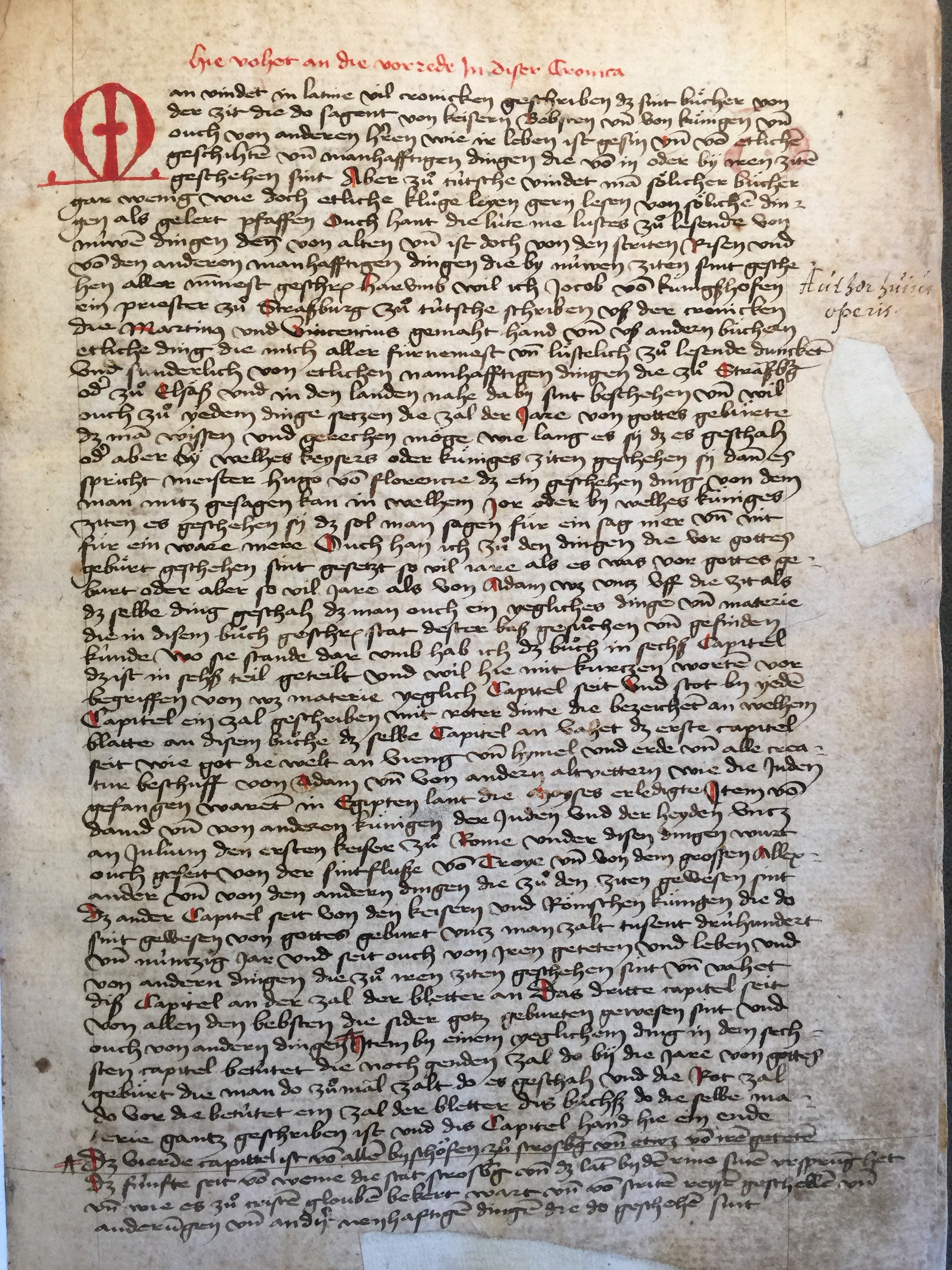Transcription by Mae Velloso-Lyons .
Cronica [vorrede] | Chronicle [Prologue]
Cronica [vorrede] | Chronicle [Prologue]
by Jakob Twinger von Königshofen
Text Source:
Stanford University Library MSS Codex 1061
Responsibility Statement:
- Transcription by Mae Velloso-Lyons
- Translation by Mae Velloso-Lyons
- Encoded in TEI P5 XML by Mae Velloso-Lyons
Editorial Principles:
Transcriptions and translations are encoded in XML conforming to TEI (P5) guidelines. The original-language text is contained within <lem> tags and translations within <rdg> tags.
This is a diplomatic transcription. Abbreviations have been expanded and are marked by square brackets. The characters "u" and "v", and "i" and "j", have been used to differentiate vowel and consonant. Where it is not clear whether a character is majuscule or minuscule, the transcriber has made a silent decision.
Texts are translated into modern American English with maximum fidelity to the original text, except where it would impair comprehension or good style. Archaisms are preserved where they do not conflict with the aesthetic of the original text. Scribal errors and creative translation choices are marked and discussed in the critical notes.
The text has been segmented into sentences by the translator.
Publication Details:
Published by Global Medieval Sourcebook.
The Global Medieval Sourcebook is licensed under a Creative Commons Attribution-Noncommercial-ShareAlike 4.0 International License.

This is a scribal error: the text should read "nit".
i.e. the birth of Christ
i.e. the birth of Christ
i.e. the birth of Christ
The copyist did not retain this feature of the original: no page numbers are given.
i.e. the birth of Christ
No page number given.
i.e. the birth of Christ
i.e. the birth of Christ
i.e. the birth of Christ
The final chapter is an alphabetical list of the events described in the chronicle, to help the reader navigate the material. The original text gives a fuller description of how this index is intended to work, which is abbreviated in this manuscript.

This is a scribal error: the text should read "nit".
i.e. the birth of Christ
i.e. the birth of Christ
i.e. the birth of Christ
The copyist did not retain this feature of the original: no page numbers are given.
i.e. the birth of Christ
No page number given.
i.e. the birth of Christ
i.e. the birth of Christ
i.e. the birth of Christ
The final chapter is an alphabetical list of the events described in the chronicle, to help the reader navigate the material. The original text gives a fuller description of how this index is intended to work, which is abbreviated in this manuscript.
This is a scribal error: the text should read "nit".
i.e. the birth of Christ
i.e. the birth of Christ
i.e. the birth of Christ
The copyist did not retain this feature of the original: no page numbers are given.
i.e. the birth of Christ
No page number given.
i.e. the birth of Christ
i.e. the birth of Christ
i.e. the birth of Christ
The final chapter is an alphabetical list of the events described in the chronicle, to help the reader navigate the material. The original text gives a fuller description of how this index is intended to work, which is abbreviated in this manuscript.

